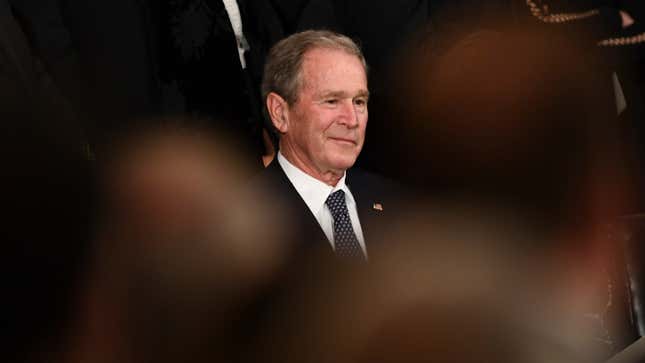If it’s incredibly galling for Bush, a man who presided over Hurricane Katrina and the killing of hundreds of thousands of people in Iraq and Afghanistan, to cosplay a man who cares about racial injustice, he was not alone in speaking about the importance of listening and hearing. “This is a time of action. But it’s also a time to listen,” California Governor Gavin Newsom wrote on June 1. Democratic presidential candidate Joe Biden, in a brief Medium post, addressed the need to combat systemic racism: “As President, I will help lead this conversation—and more importantly, I will listen,” he wrote. Even Canadian Prime Minister Justin Trudeau, who apologized last year for wearing brownface in a 2001 photograph, jumped on the listening bandwagon. “It is a time to pull people together, but it is a time to listen,” he said on Tuesday, after being asked about Trump’s violence towards protesters.
The need to listen to the voices of the most dispossessed has become a sort of standard activist tic. If “I’m listening” has, for some, become shorthand for “I’m taking action,” the hope is that listening somehow will naturally lead to a sort of reckoning, which will lead somehow to action, and then to real political change. But it’s one thing for your friend from high school to post on Instagram that they’re learning from and taking cues from black activist organizations. It’s entirely another for our nation’s elected leaders, both present and former, to speak about combatting our nation’s original sin as largely one that begins with dialogue, especially against the backdrop of extreme police repression and violence of those very same protesters whose voices they claim to be hearing. The obvious question becomes—what were you hearing before, and to whom were your ears most attuned? Those with the power to enact substantive policy change are framing this moment as something that can be solved through a sort of passiveness; it serves as a way to abdicate any responsibility, through a performance of a weird perversion of allyship. “We see you. We hear you. Your voice is what drives change now and always,” Gretchen Whitmer, the governor of Michigan and thus a woman who has an incredible amount of power to drive change, said recently.
Baked into the idea of “listening” is the belief that dialogue is the solution, and that what’s needed, ultimately, is unity—and that the ability to unite is threatened less by the violence of the police and more by the supposed violence of property destruction. It’s a sort of selective hearing—only some people are worthy of being heard. “The heroes of America—from Frederick Douglass, to Harriet Tubman, to Abraham Lincoln, to Martin Luther King, Jr.—are heroes of unity,” Bush wrote in his statement, engaging in an incredible bit of revisionist history, before adding, “We know that lasting justice will only come by peaceful means. Looting is not liberation, and destruction is not progress.”
Biden, who has been pushed to belatedly embrace what I would describe as tepid, band-aid policing reforms, has also condemned what he described as “needless destruction.”
“Protesting such brutality is right and necessary. It’s an utterly American response,” Biden wrote, “but burning down communities and needless destruction is not. Violence that endangers lives is not. Violence that guts and shutters businesses that serve the community is not.” He added, “The act of protesting should never be allowed to overshadow the reason we protest. It should not drive people away from the just cause that protest is meant to advance.”
But, as many people have reminded us, the “peaceful means” that they wish all protesters would embrace haven’t often changed the status quo. “The long hot summer has always been preceded by a long cold winter,” Martin Luther King Jr. said in his oft-quoted speech, in which he described a riot as the language of the unheard. And people have been screaming for a long time.

